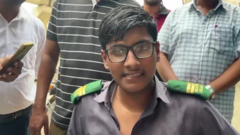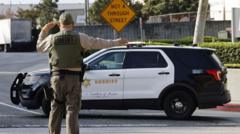Survivors are questioning the effectiveness of Pope Francis' initiatives to combat child abuse within the Church, highlighting insufficient reforms and ongoing secrecy surrounding predatory priests.
Pope Francis Under Fire: Survivors Demand More Accountability for Clergy Abuse

Pope Francis Under Fire: Survivors Demand More Accountability for Clergy Abuse
As the Catholic Church faces new leadership, victims question the adequacy of Pope Francis' measures against clerical abuse.
Abuse victims like Alexa MacPherson, who survived years of sexual assault, are raising critical questions about the legacy of Pope Francis as 135 cardinals gather in Rome to elect a new pope. Although some acknowledge strides made under Francis, such as addressing victims' grievances and modifying internal procedures, many survivors argue that the Church's response remains fundamentally lacking.
MacPherson's ordeal began at the tender age of three with abuse by priest Peter Kanchong. Her traumatic experiences and her father’s efforts to seek justice in 1984 reflect a stark reality of institutional power protecting offenders. A letter from the then-Archbishop of Boston, Bernard Law, expressed concern about potential scandal rather than prioritizing justice for victims.
While acknowledging that her abuse predated Francis' papacy, MacPherson decried the Church's insufficient actions, lamenting, "There’s just so much more that the Church and the Vatican can do." The struggles for justice initiated a decade ago culminated in a landmark settlement where over 500 victims received compensation. However, many believe the Church still harbors secrets.
Critics argue that although Francis has taken steps, such as convening bishops to discuss abuse in 2019 and adjusting Church law regarding pontifical secrecy, substantial barriers to transparency remain. Key reforms compel reporting of abuse within Church hierarchy but fail to mandate police disclosures.
MacPherson’s attorney, Mitchell Garabedian, emphasizes systemic secrecy persists, with the Church often fighting to keep abuse-related documents hidden. MacPherson articulated the survivors' demand for accountability, calling for the identification and prosecution of offenders rather than the mere reassignment of abusers.
As the Church prepares for a new pope, MacPherson remains skeptical, expressing that genuine progress hinges on acknowledging past transgressions and holding perpetrators accountable. Meanwhile, Peter Kanchong remains unconvicted and retains his clerical status, a reality that further fuels MacPherson’s frustration and highlights the Church's ongoing struggle with transparency and accountability.
The Boston Diocese remained silent on inquiries regarding Pope Francis' legacy and ongoing concerns about secrecy, leaving many victims feeling unsupported as the Catholic Church navigates this critical transition.






















